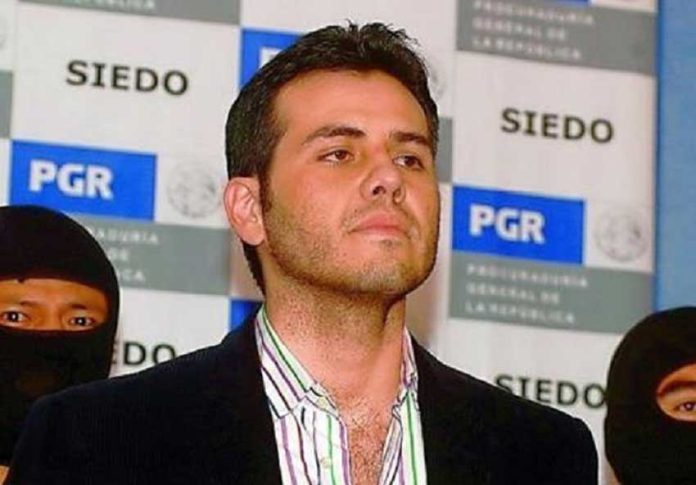Joaquín “El Chapo” Guzmán’s 2001 jailbreak in a laundry cart, a contract killing he ordered and his monthly bribery budget of more than US $1 million were among the topics jurors heard about as another cartel witness gave testimony yesterday at the New York trial of the former drug lord.
Vicente Zambada Niebla, a former Sinaloa Cartel operative and eldest son of the cartel’s current leader Ismael “El Mayo” Zambada, strode into the Federal District Court in Brooklyn just before 10:00am Thursday dressed in dark blue prison clothes. After taking the witness stand he turned to his former boss and nodded his head.
Guzmán, wearing a dark navy blue suit, met his gaze and flashed a slight smile in return.
In testimony that lasted for more than five hours, during which he betrayed secrets of the cartel he was once groomed to lead, Zambada told jurors that Guzmán, who he referred to as mi compadre (my buddy/my son’s godfather), had described to him the anxiety of hiding in the laundry cart in order to escape from Jalisco’s Puente Grande maximum security prison in January 2001.
“It seemed like an eternity to him until he reached the last barrier,” said the witness, who is also known by the nickname El Vicentillo.
At one point, Zambada explained, a prison employee cooperating with the escape briefly let go of the cart and it started rolling backwards, sending Guzmán into a panic because he feared that he would fall out and be exposed.
Once free of the prison, the witness said, El Chapo met with his father in the mountains of Sinaloa where they reached a renewed pact to share cocaine trafficking profits 50-50.
“I’m 100% with you,” Zambada said El Mayo told Guzmán.
He told jurors that the two men shipped tonnes of drugs to the United States using cars, trains, planes and submarines for different legs of the journey.
Zambada said that he first met Guzmán when he was 15 and started working for the Sinaloa Cartel in his teens, often attending meetings between his father, fellow traffickers and corrupt officials.
“I started realizing how everything was done,” he told jurors. “And little by little, I started getting involved in my father’s business.”
In 2004, El Chapo ordered the murder of Rodolfo Carrillo Fuentes, a leader in the Juárez Cartel, Zambada said.
The Juárez Cartel collaborated with the Sinaloa Cartel to ship cocaine into the United States but after Carrillo insulted Guzmán by refusing to shake his hand at a meeting, the latter paid a sicario to have the former killed, the witness said.
“They located him in a mall,” Zambada said. “They were waiting for him to come out, and when Rodolfo Carillo came out, he was murdered by mi compadre El Chapo’s people.”
Carrillo’s wife, Giovanna Quevedo Gastélum, was also killed in the attack.
The murders led to an escalation of hostilities between the two cartels, Zambada said, telling jurors that one of Guzman’s close friends was killed at a birthday party for his father.
The former cartel logistics chief, who was extradited to the United States in 2009 and pleaded guilty to drug trafficking charges as part of a plea agreement unsealed in November, told jurors that Guzmán and his father spent more than US $1 million a month to pay off police, members of the military and government officials in order to be able to move their drugs freely and to get insider information about other criminal organizations.
One army general was paid US $50,000 a month, Zambada recalled, while a military officer who once served as a personal bodyguard to former president Vicente Fox was also frequently bribed.
The witness, who hopes that he will receive a reduction to his prison sentence in exchange for cooperating with prosecutors, said that in 2007 Sinaloa Cartel leaders including Guzmán met with a group of “high-level politicians” and officials from the state oil company Pemex to discuss a plan to ship 100 tonnes of cocaine in a tanker the company owned.
Zambada said he didn’t know whether the scheme was a success. A spokeswoman for Pemex declined to comment.
When asked by the prosecution shortly after the beginning of his rambling testimony about what his father does for a living, Zambada openly admitted that he is the current Sinaloa Cartel leader.
Ismael Zambada remains on the most-wanted list of the United States Drug Enforcement Administration (DEA).
El Vicentillo is the eighth criminal witness to testify against Guzmán, who is facing charges of trafficking, conspiracy, money laundering and firearms offenses. His uncle, Jesús Zambada, has also provided insider testimony about the accused’s alleged criminal activities.
The former drug lord’s defense team has attempted to portray him as a mere underling to El Mayo Zambada.
Witnesses testifying against Guzmán are “liars,” “degenerates” and “scum” who are speaking in the hope that their own prison sentences will be reduced, one lawyer said in late November.
The trial, which started in early November, resumed yesterday after a two-week holiday recess.
Vicente Zambada is expected to appear on the witness stand again today. If convicted, Guzmán faces a probable sentence of life imprisonment.
Source: El País (sp), The Los Angeles Times (en), The New York Times (en)
